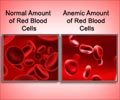Many patients being treated for cancer complain of feeling weak and tried, and doctors often prescribe an anemia treatment to relieve these
Many patients being treated for cancer complain of feeling weak and tried, and doctors often prescribe an anemia treatment to relieve these symptoms. A new study suggests that may not be a good idea.
Since anemia has been associated with worse prognosis after radiotherapy, the doctors assumed the treatment would make patients feel better and improve results of the therapy, as well.Not so, report German researchers publishing in this week’s The Lancet. Their study finds treating anemia in cancer patients with the drug erythropoietin (epoetin beta) may actually interfere with cancer treatment. Patients who did not receive the treatment had about a 60-percent better chance of surviving their cancer without a relapse than those who did receive the treatment.
The study involved 351 patients who received either erythropoietin or a placebo about two weeks before undergoing radiotherapy for head and neck cancers. While the drug was effective in treating the symptoms of anemia among the patients, the poorer outcomes seen in the drug group led researchers to conclude the benefits may not be worth the risks.
Study author Dr. Michael Henke comments: "Although epoetin beta efficiently corrects anemia among patients undergoing curative radiotherapy, it is not associated with improved cancer control or survival. On the contrary, erythropoietin might impair disease control when manifest cancer is irradiated." He calls for further research on the drug to include careful measures of cancer control and survival, along with additional study into why treatment for anemia would impact these factors in the first place.











